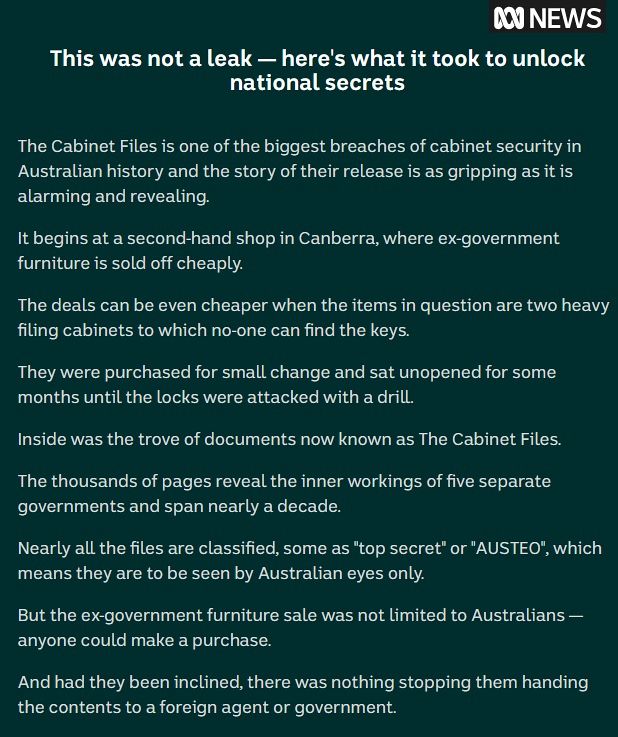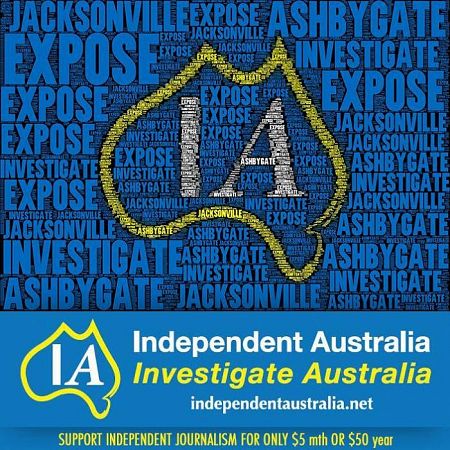Managing editor Dave Donovan and political editor Dr Martin Hirst consider the unusual story of a pair of Federal Government filing cabinets that fell of the back of a truck and miraculously landed on the ABC's front lawn.
THE ABC STORY about the cabinet files is literally unbelievable. In the sense that its cover story about how they fell into the broadcaster’s hands is bizarre and improbable.
The broadcaster said the documents came from two filing cabinets bought from a second-hand furniture market. The filing cabinets were cheap, they explained, because they were locked and came without a key. Their source, said the ABC, had drilled out the locks and found a veritable treasure trove of cabinet papers from 2008 until 2014. Cabinet papers are, of course, official secrets ‒ many of them marked "Top Secret" and "Australian Eyes only" ‒ and are subject to a statutory 30-year embargo before they are allowed to be released to the public.
But, rather than taking these documents to the police, or ASIO, or selling them to one of the commercial broadcasters for a small fortune, this apparently random “member of the public” loaded them all up and handed them over to the ABC. The ABC won’t reveal the name ‒ or anything about ‒ their source. Nor will they reveal the name or location of the second-hand store this person procured the filing cabinets from. This strangely shy establishment is apparently not at all interested in any publicity for itself or the added custom it would inevitably receive.
Today, we discovered that ASIO had at one-o-clock this morning entered the ABC offices in the Parliament House Press Gallery and in Brisbane placed all the documents in a locked safe — and left them there. The ABC has a key to this safe and can continue publishing stories based on these documents, as they have been for the past week or so. So, ASIO are working with the ABC, while the ABC has appeared to agree to not cover certain stories that have a “national security implication”. Deputy Prime Minister Barnaby Joyce has said he was very happy with the way the ABC has dealt with this matter. The Federal Police have expressed no interest in becoming involved, unlike in May 2016 when NBN papers were leaked to Labor Senator Stephen Conroy’s office and the AFP raided Labor’s offices in Parliament House. Indeed, the relationship seems very cosy indeed — almost as if the ABC is just another arm of the Federal Government’s information and security apparatus.
ASIO and ABC cooperate to preserve national security. https://t.co/85i2Xt8iE4
— Peter Cronau (@PeterCronau) February 1, 2018
The stories that have come out so far have been damaging to Labor, Kevin Rudd, Scott Morrison, Tony Abbott and Kevin Andrews. Kevin Rudd has even launched a defamation action against the ABC this morning. That was because the story they did on Monday about Rudd being warned about the dangers of the pink batts scheme in 2008 was mistaken in its emphasis. Rudd calls the ABC report ‘a lie’ and claims the document warned of “administrative” problems with the scheme, not the installation. This seems fair, as the cabinet document said nothing about installation and had been seen by the politically-motivated 2014 Royal Commission into the affair, which found he had not been warned about the safety risks. Strange that the ABC would concoct a story now on that ancient affair based on such flimsy evidence.
If all this seems totally normal and above board to you, then I have some excellent waterfront real estate you may like to see. Of course, in some ways, this is a stereotypical Canberra Press Gallery scoop ‒ documents mysteriously tumbling into journalists' hands from unnamed sources, as they have done so many times before ‒ but that doesn’t make this one reek any less.
The thought that our Federal bureaucracy is so incompetent and lacking in appropriate controls and checks and balances that it is selling off filing cabinets full of official secrets simply because they can’t find a key is utterly absurd. They do have locksmiths and crowbars in Canberra, we have been reliably informed.
The journalist who accepted the files is Michael McKinnon, who has been the Freedom of Information [FOI] Editor at the ABC since 2013. McKinnon has expressed bafflement about how this all could have happened.
In an interview conducted by his former News Corp colleague Patricia Karvales on ABC Drive last night, Michael McKinnon said he has seen firsthand “all the checks and balances, and ticking off that goes on for every document” in Government and so he had “absolutely no idea” how two filing cabinets full of papers could be sold off to a private commercial enterprise.
I'm listening to 'Behind the #Cabinetfiles' with the ABC listen app https://t.co/F91PYvpGkK
— PatriciaKarvelas (@PatsKarvelas) January 31, 2018
McKinnon continued:
“It’s not like anyone could just wheel out two filing cabinets full of documents out from Parliament House.”
Yet despite his bafflement, McKinnon maintained that there was no funny business, just a “massive stuff up”. He also gave no clues about his source, except that he was “member of the general public who wished to remain anonymous”. No discussion about any possible motivations for his source ‒ or his source’s ultimate source ‒ was initiated by either of these experienced “journalists”.
Establishing the motivations of sources is Journalism 101. Why are we receiving this information? What are they leaving out? Why do they want me to publish this? What is their agenda? Are we helping to establish a narrative that does not fully inform the public? All of those things need to be thought through in preparing a story that is comprehensive, accurate and fair — yet they did not appear to be on anyone’s radar at the ABC.
There are several unanswered questions in the ABC’s account of how the documents came into their possession:
1.We have to take ABC word on origin of papers — how do we know that story of second hand purchase holds up?
2.The person who gave papers to ABC says the filing cabinets were bought in a sale — where from, what date?
3.It’s easy to bodgy up an invoice. Has the ABC seen the bill of sale and confirmed it was genuine or are they taking on trust the story they have been told.
4.The actual content of the cabinet is weird — select papers from five previous governments, but not the current one. Has the ABC studied their find and worked out what has been left out? This may help determine the source and point to their motivation.
The real story may or may not emerge about how these documents really came about, but let us provide an alternative scenario...
And this from the IA email notices this morning is interesting?? pic.twitter.com/IvKrlvIHrY
— Paul B (@kiwipaulb) February 2, 2018
This is an excerpt from the latest weekly Independent Australia subscriber only editorial. You can read the rest of this article in the IA members only area.
Subscribe to Independent Australia HERE.
You can follow managing editor Dave Donovan on Twitter at @davrosz and political editor Dr Martin Hirst at @ethicalmartini.
It seems ASIO just dropped off a safe, then left. ABC say they still have access to the documents and the safe is "within the ABC premises" in Parliament House. So the #CabinetFiles haven't been confiscated, just put in a different container? https://t.co/sMwgjAz6YR
— Josh Butler (@JoshButler) January 31, 2018
Monthly Donation
Single Donation
ABC agrees to return secret documents found in old filing cabinets https://t.co/o5taGgUb8O So that's that is it? #CabinetFiles #auspol
— Melanie McCartney (@CartwheelPrint) February 1, 2018











